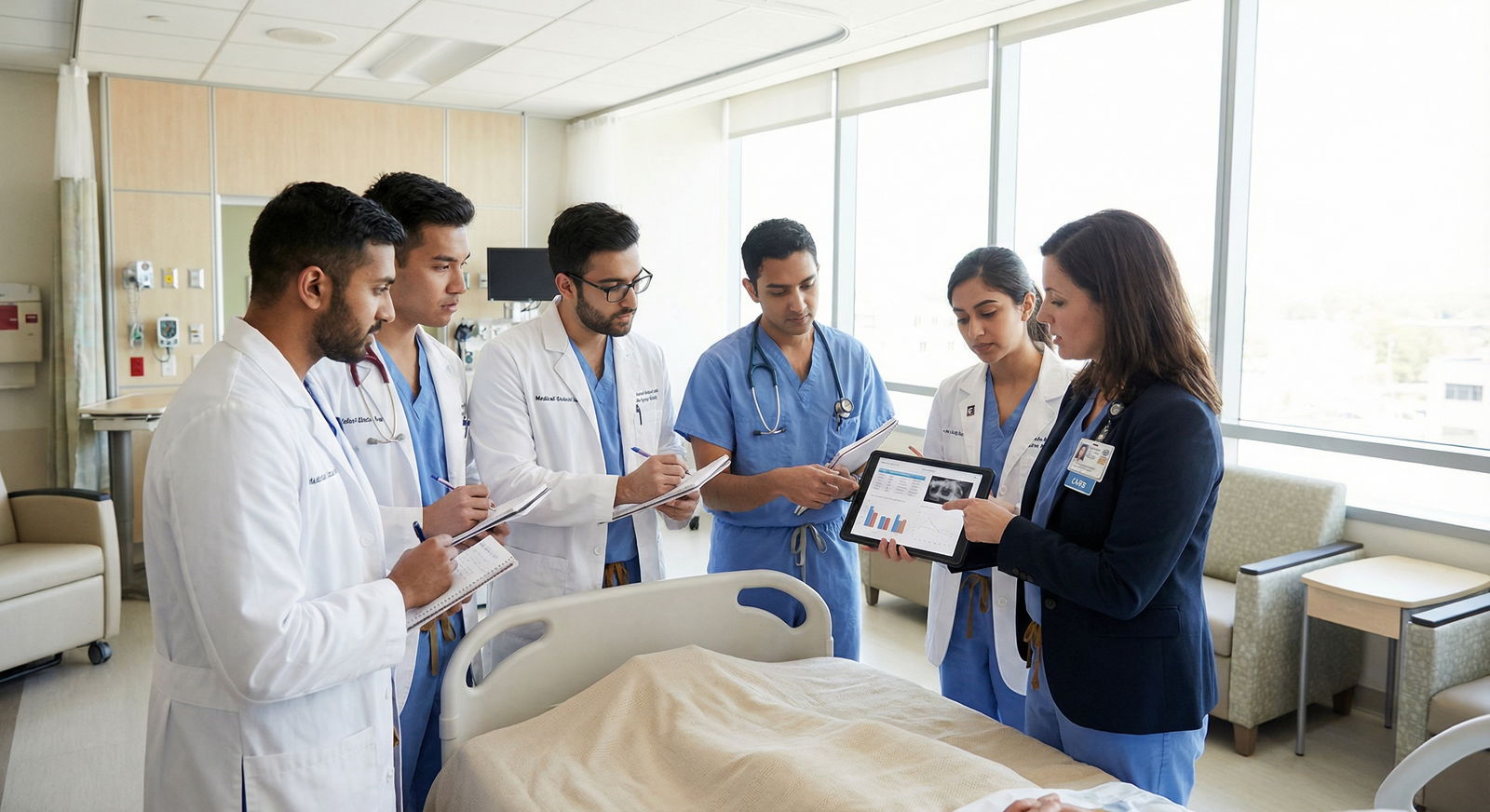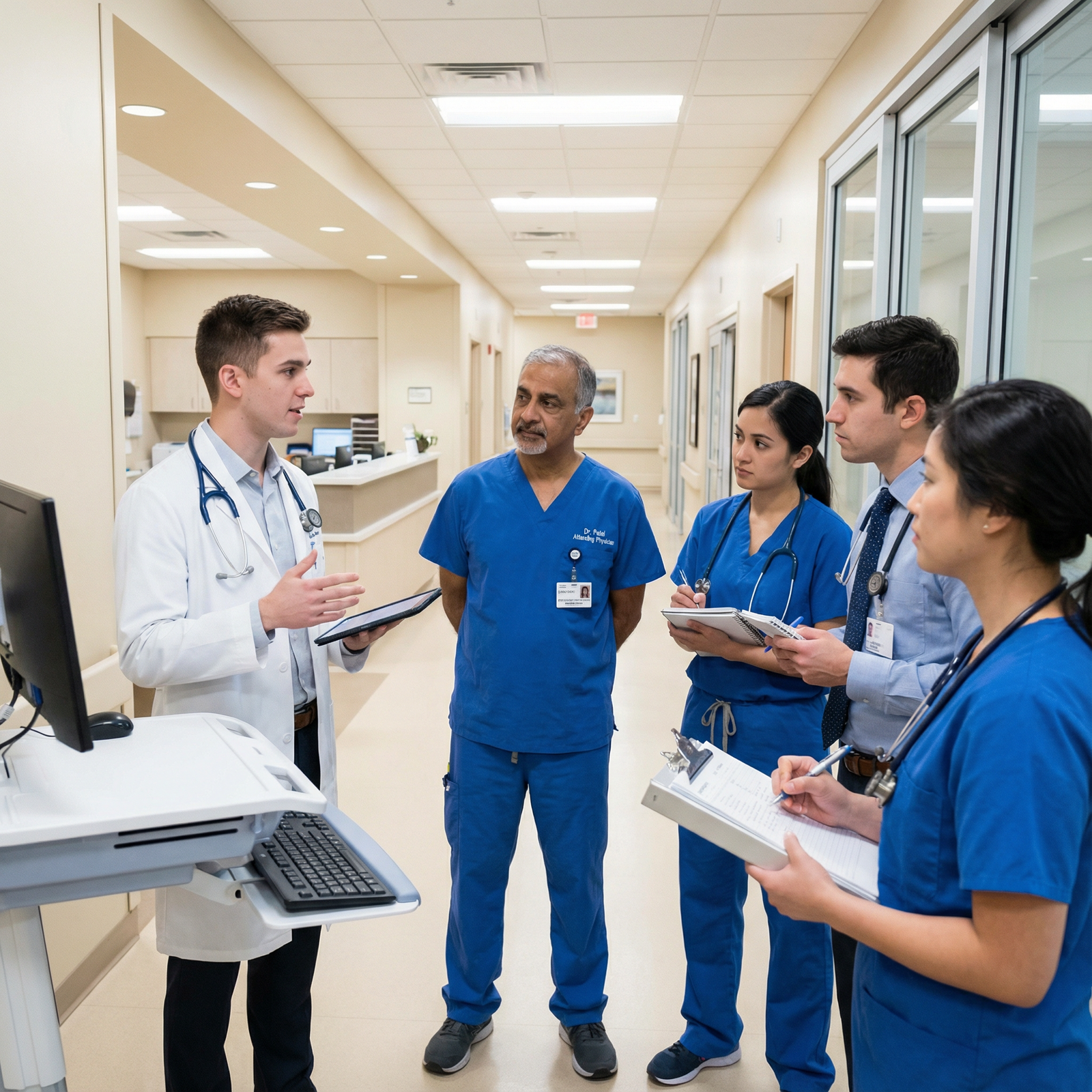
How Clerkships Shape Your Residency Application Strategy
The clinical years of medical school are where your identity as a future physician truly takes shape. Clerkships—your core and elective clinical rotations—are not just graduation requirements; they are one of the most influential components of your residency applications and ultimate career trajectory.
Understanding which clerkships help most, how to use them strategically, and how to stand out during them can dramatically strengthen your chances of matching into a desirable residency program and specialty. This guide breaks down the most beneficial clerkships for residency applications and offers practical, step-by-step strategies to maximize every rotation.
Understanding Clerkships and Their Role in Residency Applications
What Are Clerkships in Medical Education?
Clerkships (clinical rotations) are structured periods—usually during the third and fourth years of medical school—where you work in real clinical settings under supervision. You’ll usually complete:
Core Clerkships (required)
- Internal Medicine
- General Surgery
- Pediatrics
- Psychiatry
- Obstetrics & Gynecology
- Family Medicine
- Sometimes Neurology, Emergency Medicine, or others depending on your school
Elective Clerkships
- Subspecialty rotations (e.g., Cardiology, Orthopedic Surgery, Neonatology)
- Away or “audition” rotations at outside institutions
- Research electives or unique clinical experiences (e.g., global health, rural medicine)
These rotations are where you:
- Learn to translate textbook knowledge into patient care
- Build your professional reputation among faculty and residents
- Gather much of the evidence residency programs will use to judge your readiness
Why Clerkships Matter So Much for Residency Applications
Clerkships impact several major components of your residency application:
Clinical Competence and Evaluations
- Rotation evaluations and grades show programs how you perform in real clinical environments.
- Narrative comments from attendings and residents often highlight your work ethic, teamwork, initiative, and growth.
Letters of Recommendation (LoRs)
- Your best letters almost always come from clerkship attendings or subspecialty rotations.
- Strong LoRs can distinguish you from other applicants with similar scores or academic metrics.
Specialty Choice and “Fit”
- Direct exposure to different specialties helps you decide where you belong—and just as importantly, where you don’t.
- Clerkship performance in your chosen field signals “fit” and commitment to residency programs.
Networking and Mentorship
- Clinical Rotations are your primary opportunity for Networking with practicing physicians, fellows, and residents.
- These connections can lead to research projects, advocacy opportunities, and mentorship that continues into residency and beyond.
Building a Coherent Application Story
- Your clerkship experiences help shape your personal statement, ERAS application, and interview talking points.
- A strong alignment between your rotations, extracurriculars, and stated career goals makes your application more compelling.
The Most Beneficial Core Clerkships for Residency Applications
Not all clerkships contribute equally to every specialty, but some are broadly influential. These rotations are essential for building your clinical foundation and for signaling readiness to residency programs.

1. Internal Medicine: The Clinical Foundation for Many Specialties
Internal Medicine (IM) is often regarded as the backbone of clinical training and is one of the most heavily weighted clerkships in residency evaluations.
Why It’s High-Yield for Residency Applications
Universal Relevance
Nearly all specialties benefit from strong IM skills—Family Medicine, Neurology, Radiology, Emergency Medicine, Anesthesiology, and many surgical fields all intersect with internal medicine pathophysiology.Diagnostic Reasoning
You’ll develop systematic approaches to:- History-taking and physical exams
- Differential diagnosis formulation
- Evidence-based management of chronic and acute diseases
Letters and Evaluations Carry Weight
IM attendings are familiar with evaluating students for residency readiness, and their letters are highly respected, even for non-IM specialties.
How to Maximize Your Internal Medicine Clerkship
- Volunteer to present patients during rounds and follow them longitudinally.
- Read daily about your patients’ conditions and treatment plans.
- Ask for mid-rotation feedback and actively work on at least one specific skill (e.g., presentations, note structure, physical exam thoroughness).
- If interested in IM or a related subspecialty, identify early potential letter writers and meet with them to discuss your goals.
2. Surgery: Demonstrating Work Ethic and Technical Aptitude
The General Surgery clerkship is often intense, with early mornings, long days, and high expectations. It is a crucial testing ground for procedural skills, team-based care, and resilience.
Why It Matters for Residency Applications
For Surgical Fields (General Surgery, Ortho, ENT, Urology, Neurosurgery, Plastics):
- Surgery clerkship performance and letters are often the single most important clinical metrics.
- Programs look for stamina, technical interest, and ability to function in an OR team.
For Non-Surgical Fields
- Shows you can handle demanding schedules and high-acuity settings.
- Highlights your ability to think quickly and manage perioperative issues.
How to Stand Out on Surgery
- Be the most prepared student in the OR: review anatomy, indications, and steps of common procedures beforehand.
- Perfect the basics: knot-tying, instrument handling, suturing—practice outside the OR when possible.
- Help the team run smoothly: anticipate needs, prep the room, and assist with post-op tasks.
- Ask for concrete tips from residents: “What’s one thing I can improve to be more helpful in the OR tomorrow?”
3. Pediatrics: Communication and Family-Centered Care
The Pediatrics rotation highlights your ability to care for children and to communicate with families—a highly valued skill for many specialties.
Why Pediatrics Is Beneficial
Holistic Care and Developmental Focus
You’ll gain insight into:- Growth and development milestones
- Preventive care and vaccination schedules
- Complex family dynamics and social determinants of health
Cross-Specialty Benefits
Pediatrics experience is particularly helpful if you are considering:- Family Medicine
- Emergency Medicine
- Med-Peds
- Pediatric subspecialties (e.g., Pediatric Neurology, Pediatric EM, Pediatric Surgery)
How to Maximize the Pediatrics Clerkship
- Practice age-appropriate communication: learn to adjust your language for toddlers, school-age children, and adolescents.
- Observe and emulate effective ways attendings engage parents/guardians in decision-making.
- Demonstrate patience and empathy—qualities often highlighted positively in evaluations and letters.
4. Psychiatry: Understanding the Mind in Every Specialty
Psychiatry is increasingly recognized as critical to high-quality, comprehensive care across the spectrum of medicine.
Why Psychiatry Helps Your Application
Mental Health Literacy
Nearly every specialty encounters mental health comorbidities—depression, anxiety, substance use, cognitive disorders, and more. Programs value applicants who recognize and address these issues.Advanced Interview and Communication Skills
- You’ll refine open-ended questioning, active listening, and motivational interviewing.
- These skills translate directly to better patient rapport in any specialty.
Interdisciplinary Collaboration
Working with social workers, psychologists, and other team members builds comfort with interprofessional care—something many residency programs emphasize.
How to Shine in Psychiatry
- Take the time to build trust during patient interviews; don’t rush.
- Show curiosity and compassion in your written notes and oral presentations.
- Learn basic frameworks for risk assessment (suicidality, harm to others) and demonstrate you can apply them thoughtfully.
5. Obstetrics & Gynecology: Women’s Health and Procedural Exposure
Obstetrics and Gynecology (OB/GYN) offers a blend of primary care, surgery, and high-intensity acute care.
Why OB/GYN Is Valuable for Residency Applications
Core Women’s Health Training
Essential for:- OB/GYN
- Family Medicine
- Emergency Medicine
- Internal Medicine (especially primary care-oriented paths)
Procedural and Operative Experience
Exposure to vaginal deliveries, C-sections, and gynecologic surgeries highlights your ability to function in rapidly changing, high-stakes situations.Interpersonal and Emotional Intelligence
You’ll be present for some of the most meaningful and sometimes difficult moments in patients’ lives—births, miscarriages, cancer diagnoses. How you handle these is often commented on in evaluations.
How to Maximize OB/GYN
- Learn the basics of fetal monitoring interpretation and labor progression.
- Be present, helpful, and empathetic during labor and delivery—small acts (explaining what’s happening, offering support) are often remembered.
- If you’re interested in OB/GYN or FM with OB, express your interest early and ask how you can get more involved.
6. Emergency Medicine: Acute Care, Triage, and Rapid Decision-Making
Emergency Medicine (EM) clerkships expose you to undifferentiated patients and time-sensitive conditions—an excellent test of your clinical reasoning and adaptability.
Why Emergency Medicine Is High-Impact
Broad Exposure in Short Timeframes
You’ll see trauma, cardiac emergencies, infections, psychiatric crises, and more—valuable for:- EM
- Internal Medicine
- Surgery
- Critical Care
- Many other specialties
Decision-Making Under Pressure
Your ability to stabilize, prioritize, and communicate clearly in high-stress situations will be closely observed.Strong Letters of Recommendation
EM attendings are used to writing structured, comparative letters (often SLOEs in the U.S.) that residency programs highly value.
How to Excel in Emergency Medicine
- Take ownership of your patients: from initial evaluation to disposition planning.
- Practice concise, structured oral case presentations (EM values brevity and clarity).
- Learn and use clinical decision tools (e.g., HEART score, Wells criteria) and discuss your reasoning.
Strategic Clerkship Planning for Residency Applications
Beyond the core rotations, your choices in timing, location, and electives can strongly influence your residency prospects.

Aligning Clerkships With Your Career Goals
1. Clarify Your Specialty Interests (Even If Tentative)
After each rotation, ask:
- What did I enjoy most and least?
- Could I see myself doing this day after day?
- Did I connect with the patient population and clinical problems?
Use early third-year clerkships to explore broadly. By mid–third year, start narrowing down likely specialties.
2. Use Electives Strategically
Elective clerkships can:
- Deepen experience in your intended specialty (e.g., Cardiology for IM applicants, NICU for Pediatrics applicants).
- Strengthen a “backup” specialty if your first choice is very competitive.
- Highlight unique interests (e.g., global health, palliative care, rural medicine) that differentiate your application.
Examples:
Aspiring Dermatology Resident:
- Strong IM and Pediatrics performance
- Dermatology elective(s), possibly an away rotation
- Related research if possible
Aspiring Orthopedic Surgeon:
- Strong Surgery and EM clerkship performance
- Orthopedic sub-internship and sports medicine rotation
- Letters from orthopedic faculty and general surgeons
Timing Your Key Clerkships
Where your high-priority clerkships fall in your schedule can affect your application:
Early vs. Late Internal Medicine or Surgery
- Early: Steeper learning curve but more time to recover if performance isn’t ideal; earlier letters.
- Late: Potentially stronger performance with more clinical experience, but less time before application deadlines.
Sub-Internships (“Sub-Is”) in Chosen Specialty
- Aim for late third year or early fourth year so letters are ready for ERAS.
- Treat sub-I as an audition for residency-level responsibility.
Networking and Mentorship During Rotations
Networking in medical education is not about superficial connections—it’s about genuine professional relationships.
Practical Networking Tips During Clerkships
- Identify 1–2 attendings on each rotation you respect and would like to learn from.
- Ask to meet briefly to discuss:
- Your career interests
- Their career path
- Suggestions for electives, research, or skills to develop
- Follow up with a short thank-you email summarizing your takeaways.
When and How to Request Letters of Recommendation
- Ask near the end of the rotation, once the attending has seen your growth.
- Be specific: “Would you feel comfortable writing a strong letter of recommendation for my [X specialty] residency applications?”
- Provide:
- Your CV
- A brief summary of your goals and what you learned on the rotation
- Any forms or submission instructions
Making the Most of Every Clerkship: Actionable Strategies
Regardless of specialty interest, every clerkship is an opportunity to show residency programs that you are coachable, reliable, and committed to patient care.
Core Behaviors That Residency Programs Value
Across all specialties, faculty tend to look for:
- Work Ethic and Reliability
- Show up early, stay engaged, follow through on tasks without reminders.
- Teamwork
- Help co-students, communicate clearly, and support residents rather than creating extra work.
- Growth Mindset
- Actively seek feedback, accept it non-defensively, and show visible improvement.
- Patient-Centeredness
- Treat patients and families with respect, empathy, and clear communication.
Concrete Steps to Stand Out Clinically
Prepare Before Each Rotation
- Review common conditions and basic management for that specialty.
- Familiarize yourself with common medications, procedures, and inpatient workflows.
Own Your Learning
- Set 1–2 specific goals for each clerkship (e.g., “Improve efficiency of presentations,” “Become comfortable with abdominal exams”).
- Read about your patients’ diagnoses nightly and share relevant learning the next day.
Document Professionalism
- Keep a running list of positive feedback or impactful patient encounters.
- These notes will be invaluable for personal statements and residency interviews.
Seek Diverse Experiences
- Ask to see interesting cases, join procedures, or follow patients to imaging or the OR.
- Show curiosity beyond minimum requirements.
FAQ: Clerkships and Residency Applications
Q1: How early should I start planning clerkships with residency applications in mind?
A1: Start thinking strategically by the end of your preclinical years. You don’t need a final specialty choice, but you should:
- Understand which core clerkships are most heavily weighted for most specialties (e.g., Internal Medicine and Surgery).
- Have a tentative plan to explore several areas of interest in your early rotations.
By mid–third year, you should be actively aligning electives and sub-internships with one or two likely specialties.
Q2: If I decide on a competitive specialty late, is it too late to adjust my clerkship plan?
A2: Not necessarily. If you decide late:
- Prioritize a sub-internship and at least one elective in the chosen specialty as early as possible in fourth year.
- Seek out mentors in that field to help you identify high-yield rotations and research opportunities.
- Strengthen related clerkships (e.g., IM for Cardiology, Surgery for Ortho/ENT) and request strong letters from those attendings.
You may also want to develop a realistic “parallel plan” specialty, depending on your competitiveness.
Q3: How important are away rotations (“audition rotations”) for matching?
A3: Away rotations can be very important in certain competitive fields (e.g., Orthopedics, Neurosurgery, Dermatology, EM) and less critical in others.
- They’re most valuable when:
- You want to match at a specific institution or in a specific geographic region.
- Your home institution lacks a strong department in your chosen specialty.
- They’re high-stakes: you’re essentially auditioning for a residency spot, so only pursue away rotations when you’re prepared to perform at a high level.
Q4: What if I don’t perform well on a key clerkship like Internal Medicine or Surgery?
A4: One weaker rotation does not ruin your residency chances. To recover:
- Request honest feedback to understand what went wrong (organization, knowledge gaps, communication, or something else).
- Demonstrate improvement on subsequent rotations—programs look for trajectory, not perfection.
- Excel in related rotations and sub-internships, and obtain strong letters to counterbalance the weaker evaluation.
- Be prepared to address this constructively if it comes up in interviews (focusing on what you learned and how you improved).
Q5: How can I ensure that my clerkships translate into a strong, cohesive residency application?
A5: Think of your clerkships as the backbone of your application narrative:
- Use your best rotations and most meaningful patient encounters to shape your personal statement.
- Highlight consistent themes across rotations (e.g., interest in underserved care, love of procedures, passion for complex chronic disease management).
- Choose letter writers who can speak to these themes and to your growth over time.
- Reflect on your clerkship experiences early and often so that, by application season, you can clearly articulate why you’re pursuing your chosen specialty and what you bring to a residency program.
Clerkships are far more than required blocks of time; they are your proving ground, your networking platform, and the clearest window residency programs have into your potential as a future colleague. By approaching each rotation with intentionality—choosing strategically, engaging fully, and seeking mentorship—you not only strengthen your residency application, you also lay the foundation for a fulfilling medical career.






















